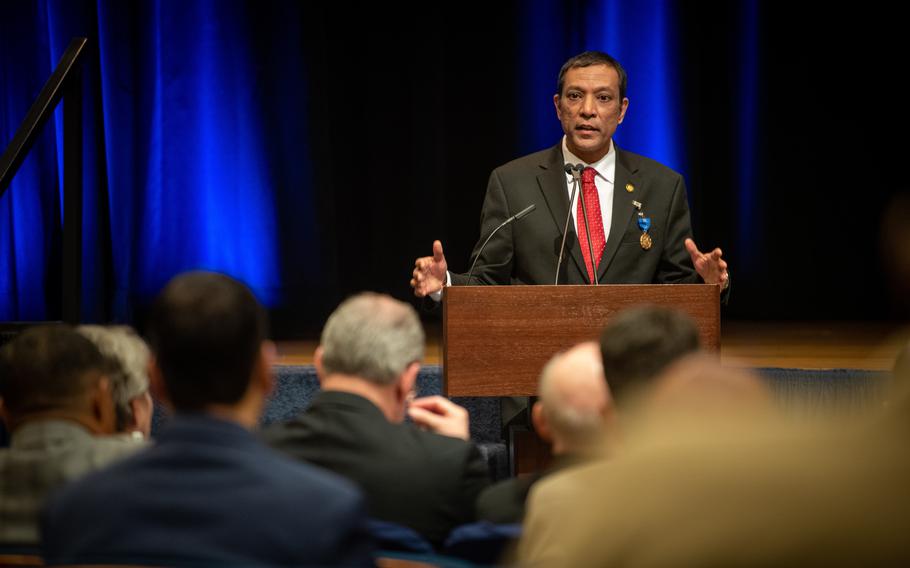

Raj Iyer speaks at the Pentagon on Feb. 10, 2023, as the Army’s chief information officer. His transition from that job to the private sector in March 2023 is the subject of a Justice Department investigation. ServiceNow, the company involved in the investigation, reported its concerns after an internal investigation found Iyer’s hiring violated company policy. (Army )
A former Army chief information officer’s move into civilian employment has sparked a Justice Department investigation after the company that hired him received a complaint about his involvement in a government contract, according to ServiceNow, the technology vendor embroiled in the situation.
ServiceNow said it is cooperating with federal investigators and has informed the Defense Department inspector general and the Army Suspension and Debarment Office about the inquiry. The Army office makes decisions on whether companies violated policies and should be barred from contracting with the service for a length of time.
Raj Iyer, who the Army hired in November 2020 as its first civilian chief information officer, left that job in March 2023 to lead the global public sector for ServiceNow, a cloud-based software and artificial intelligence company based in California.
A year after Iyer joined ServiceNow, the company said it had received an internal complaint about his hiring and potential compliance issues during the procurement process of one of its government contracts, according to a company report released July 24.
Through a ServiceNow investigation that involved outside legal counsel, the company determined its president and chief operations officer Chirantan “CJ” Desai violated company policy regarding a possible conflict when hiring Iyer, according to the report.
Desai cooperated with the investigation and said he did not intentionally violate policy, yet he and Iyer resigned from ServiceNow last month.
“ServiceNow believes this was an isolated incident,” said Madison DaValle, spokeswoman for the company. “The investigation is ongoing, and we will continue to cooperate with the government entities reviewing this matter as it moves towards resolution. We have a longstanding reputation for integrity and compliance. This means we take swift and immediate action not only on improper conduct but even on conduct that could create an appearance of impropriety.”
The Justice Department and Pentagon inspector general declined to comment about or confirm investigations. The Army is aware of the situation but cannot comment at this time, said Maj. Montrell Russell, a spokesman for the Army.
Iyer said Thursday that he did not commit any wrongdoing and his time in the Army was guided by “integrity and a steadfast commitment to the best interests of the U.S. Army and the American people.”
“My resignation from ServiceNow was voluntary and aligns with my personal values, and I do not wish to have my integrity questioned as a result of a potentially compromised hiring process,” he said.
The fact that two people resigned their jobs is a big deal, said Dan Meyer, a Washington-based attorney with Tully Rinckey who specializes in federal employment law.
When a federal employee leaves the government, he or she can’t engage with their previous agency for one year. There’s also a lifetime ban for that person to work on anything where they made substantial decisions, he said.
ServiceNow did not name the contract in question, though DaValle said it was a consolidation of several contracts.
The Army touted in May 2023 that it awarded a $432 million, five-year contract to Carahsoft Technology Corporation for ServiceNow Term Software Licensing in December 2022 – three months before Iyer went to work there.
Army Contracting Command described the deal as an “enterprise agreement” that consolidated existing management licenses and the purchase of new ones. It was intended to improve the Army Enterprise Service Desk, which personnel use to resolve technical issues.
Senior leadership in Iyer’s office were involved in the “sole-source” contract that was rushed through at the end of the year to lock in cheaper pricing, according to the Army.
“Sole-sourcing contracts is a red flag for investigators,” Meyer said. “If there was no competition, this may have been a case of steering contracts.”
From his own time as a federal investigator, he said sole-source contracts tend to catch the attention of investigators to take a hard look at the process.
The contract has been 33% fulfilled, according to online records.
Army Contracting Command did not respond to questions about the contract or whether there are any investigations into it.